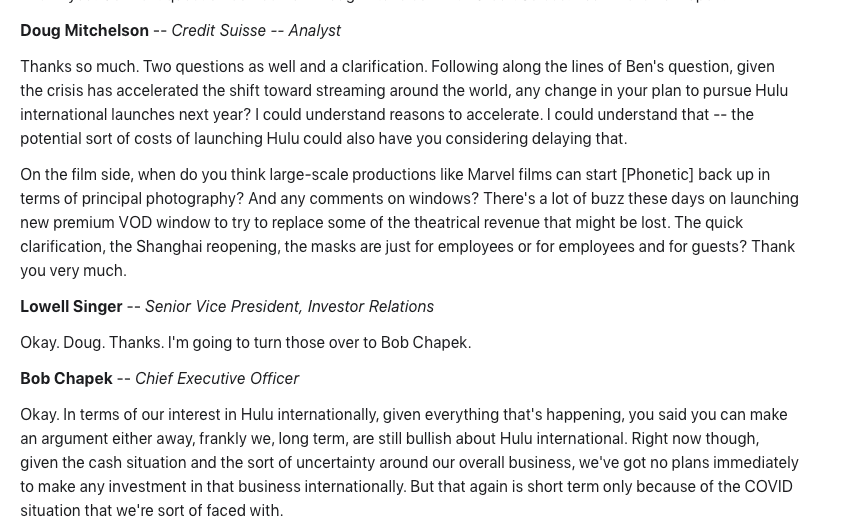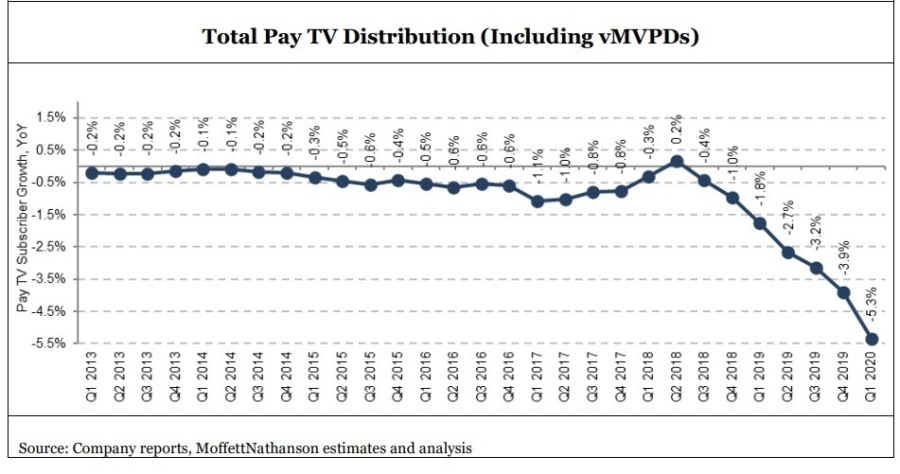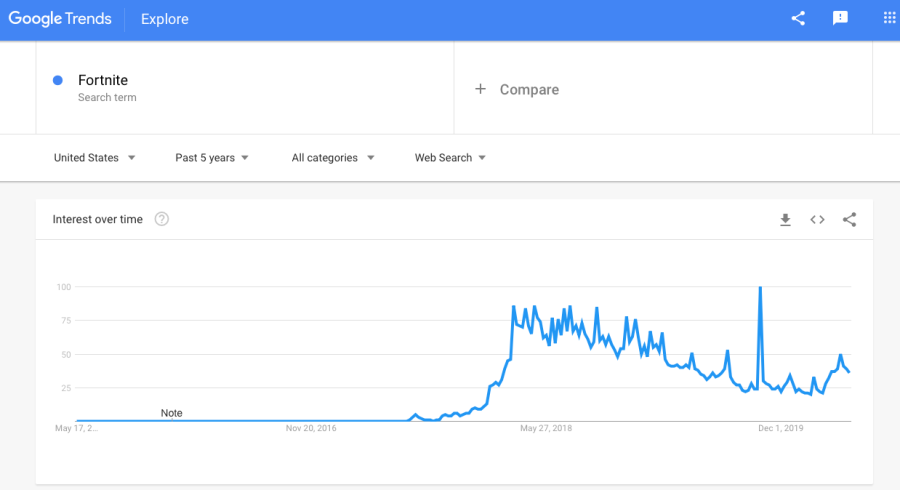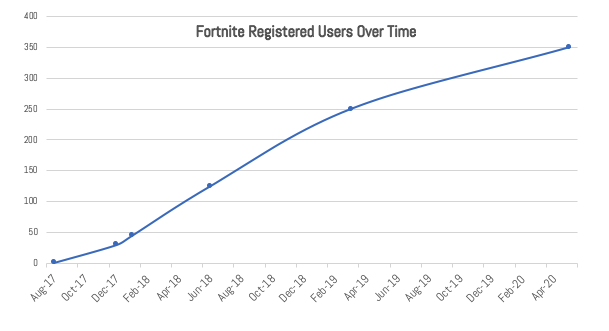This week’s column started out as an extended essay on the future of TV and Film production in the age of coronavirus. It went long, so expect it early next week. (Next week’s article already written? Check!)
Before we get to the news, a quick set of housekeeping. On Twitter, I put out the offer to build my network with any of my readers. If you’d like to chat, send me an email and we’ll see if we can set something up. I’m in particular looking for new opportunities to grow my audience or partner with businesses (be it consulting or writing or what not). Even if you don’t have an opportunity, but just want to chat, let’s do it.
Meanwhile, my website is still free. So if you want to support my work, the best way is to follow on social media (Twitter, Linked-In, newsletter) and share any articles you like with friends, peers and colleagues. Seriously, forward my column to everyone in your company. Why not?
Most Important Story of the Week – Hulu International Launch Delayed
Sometimes, I wonder why everyone in media leads with the same headline after certain events. This goes from politics to sports to entertainment journalism. Take post-debate coverage. Somehow CNN, The New York Times, the Washington Post and Politico all take the exact same quote as the most important of the debate. How is it that dozens of political reporters can watch the same event and all come to the same conclusion?
(The answer? Group think and herding. As soon as one outlet goes with something, the rest copy it so they don’t look like outliers. Or “biased”.)
Personally, I think you’d get more credit by zigging while everyone else zags. Which is what I try to do. So when everyone else focused on Disney’s earning report for the losses to theme park–which were totally expected–I saw this line about Hulu’s International roll out from Bob Chapek:
 (Credit to Twitterzen TMTonka for reminding me of it.)
(Credit to Twitterzen TMTonka for reminding me of it.)
In the short term, aggressive Hulu international expansion is on pause. At first, I was ready to write about how bad this was for Disney. But then I paused and thought about it. While it is a bad sign for Disney’s cash flow, the Hulu international rollout is less of a surefire hit than Disney+. It’s more important that Disney figures out Hulu’s international brand than launching it quickly.
Frankly, as bullish as I am on Disney+, I understand it’s limitations. Disney+ is like the best children and blockbuster content from Netflix, stripped out into its own service, and taken to the max. Yet that has a ceiling. Even four quadrant content (industry lingo for broadly appealing to men, women, young and old) still doesn’t do it for everyone. Some folks don’t like superheroes. (“Some folks” being code for critics.) Or don’t have kids.
Which is why Hulu is there to fill in the gaps. It features prestige dramas from FX and day-after air broadcast fare for everyone else. (If I were advising Disney’s head of streaming Kevin Mayer, that latter category is where I’d tell him to lean into. See my last article on ignoring “middle America”.) If broadcast TV “does multiple jobs” for customers, Hulu & Disney+ reaches pretty much covers all those bases. Add in ESPN+ and Disney recreated a great bundle.
As an added benefit, with three sets of subscribers to count, Disney is hot on Netflix’s heels in “total subscriber” count. My guess is Disney will soon match Netflix in the United States for total subscribers. And will tell us when they reach that milestone in a future earnings call. (Disney doesn’t yet break out by territory, but I still think a majority of customers are US.)
The shiny object, though, is for Disney to catch up with Netflix internationally as well. That’s the downside to delaying Hulu international expansion. Now it will take that much longer to match Netflix.
Or will it? I’ve long been skeptical about arguments about “global scale”. Not that being international doesn’t confer some advantages, but that most valuable content doesn’t travel globally. You see this in Netflix’s Top Ten lists, which feature some outliers, but for the most part feature local content. Does global scale really exist if you still have to buy local originals for every territory?
Of Disney’s catalogue, Hulu is the brand that will travel the least well. Lots of Hulu/FX originals, while lauded at home, are fairly esoteric for foreign audiences. International audiences don’t get subtle humor about life in New York by/for millennials. (Again, neither do many audiences in the United States.) The best traveling content is animated kids movies and Marvel films. Both of which are on Disney+! So Hulu’s upside globally is probably more limited than we suspect. Which means even if it did launch internationally, I’m not sure it has nearly the same growth prospects as Disney+.
Disney will still try, of course. The rewards for a global streamer are too big to ignore. Which gets back to the delay. It is a really bad sign that cash flow has dried up so much they can’t invest in growth. Whether or not I think Hulu will thrive internationally, that was their next major capital expenditure. Which is still bad.
Other Contenders for Most Important Story
Quibi Blames the Pandemic
This week Jeffrey Katzenberg blamed the pandemic for Quibi’s soft launch. Let’s play out both sides, and you can decide how right he is.
On one hand, situations absolutely matter. The role of luck in life is increasingly apparent. At its core, if Jeff Bezos graduated in 2000, instead of being a VP at an investment bank during the 1980/90s, he doesn’t start Amazon. Is he still successful? Yes. Is he Jeff Bezos? Maybe not.
Same for the pandemic. If the pandemic started a year from now, it would likely still wreak the same havoc on the economy. But HBO Max, Quibi, Peacock and Disney+ would all be safely launched. And likely benefit due to their established services. (It’s hard for HBO Max to benefit when it isn’t even launched.)
Quibi’s core value proposition was damaged by the pandemic. It was meant to be watched on the go, and we as a society aren’t going. Katzenberg is right about that.
On the other hand, come on. I’d long believed that Quibi needed to be on living room TVs to succeed. This was regardless of a pandemic or not. Quibi didn’t have a big hit to lean into, and that means that they’re fundamentally at a disadvantage. And no library content. Even with no pandemic, I could see Quibi having the exact same number of subscribers as it does now. Maybe a little more, maybe a little less.
Either way, I think we can say that Quibi is in trouble. How much will require some scoops by some intrepid journalists.
Potential Original Trouble in Netflix-Land
While all other studios and TV producers announce their schedule will be impacted by Covid-19, Netflix insists all it’s content is produced and there won’t be any impact to their schedule. But then, despite having a policy to release all content day-and-date dubbed in original languages, the Unbreakable Kimmy Schmidt special came out in English only.
Hmmm.
Entertainment Strategy Guy Update – Coronavirus Edition
Theaters – Studios/Theaters Locking in Schedules
That’s my take on Warner Bros and Disney both reaffirming their late July release schedules. At some point, films can only be pushed back for so long without hurting the bottom line. If theaters will only be partially reopened from July to December anyways, you may as well recoup what you can. My read of the coverage is that Tenet and Mulan are increasingly likely to stick at the end of July. As THR wisely points out, blockbuster films are likely to do okay post-pandemic since theater chains can flex them into as many theaters as necessary.
This gives theaters 8 weeks or so to get customers ready to go back to theaters. My guess? The return of library films like Star Wars or Wizard of Oz or John Wick or you name it will allow a bunch of fun experimentation in June.
Meanwhile, Solstice Studios (a new independent production house) grabbed the July 4th weekend with its Russel Crowe thriller Unhinged. If people start returning to theaters in June, part of me still wonders if another studio jumps up to July 4th. Usually, long lead times for advertising campaigns would prevent this. But given the pain in linear TV for advertising, I think the networks would make an exception. (Ad prices are so low that a film could quickly get share of voice.)
Still, all of this is incredibly uncertain. So we’ll see.
Pay TV – Losses Continue in MVPDs in Q1 (in Context)
The quarterly Moffett-Nathanson report is out on the status of cord cutting and the results are expectedly grim:

Of course, the funny thing–as I tried to warn you on Twitter the week before–is that this isn’t proof that Covid-19 is accelerating the trends underlying economics. I know, I know. You read everywhere–I mean everywhere–that coronavirus will “change everything” and “accelerate all the underlying trends in entertainment”. Seriously, I won’t link to them, but I’m the only entertainment biz analyst NOT making this unfounded claim.
So where do I get off challenging them?
Well, I start with the numbers. Frankly, adoption of new trends is a well studied phenomena. Usually summarized by the “Bass Diffusion curve”, a topic I went deep into last fall.
Cord cutting is following the same pattern in reverse. So should we have expected growth of cord cutting to accelerate this quarter, as even more streaming options launch? Absotutely. To be clear, we expected the “growth to grow” this quarter if cord cutting is an adoption trend. Which is exactly what happened!
In other words, where everyone is ready to give Covid-19 credit for hurting Pay-TV, I see a trend that is continuing at the same pace. Which is still really, really, really bad for the Pay-TV business. But it would have been bad whether or not Covid-19 happened. Meanwhile, if coronavirus did temporarily accelerate teh trend, when sports return it could reverse itself.
Still, all of this is incredibly uncertain. So we’ll see.
Data of the Week – Did Coronavirus Save Fortnite/Epic Games?
I’m a bit more bearish on Fortnite’s future than a lot of others. I get it; they’re about as buzzy as you can get. And like Tik Tok, they’re also mysterious to adults. That’s a double whammy for hype.
Instead of relying on hype or their datecdotes, I look for the data. The news from last week is they passed 350 million registered players. The last update was last March when they had 250 million subscribers.
So what should be the narrative of Fortnite? I’ll give you two options. Then we can look at the data.
- Fortnite has grown consistently and will consume the world via it’s metaverse.
- Fortnite was declining, then Covid-19 freed up a lot of time for kids.
For the data, start with my article on Fortnite from last year on Linked-In. I projected they’d end up with 300-325 million registered users. So they passed my expectations. (To be fair to me, given the very limited data points my margin of error was fairly wide. I was overfitting the curve to the data.) Here’s my chart of updated Google Trends. See if you notice what happened.

The explanation? Well, kids are the ones consuming the most content–video and video games–during the Coronavirus. Parents are trying to work from home where possible, but schooling is for the most part not happening. (Is this bad for society? Yes.) Look at this excellent Nielsen chart on it.

To finish, here’s my line chart of Fortnite registered users. It looks pretty “Bass-y”.

Without reliable traffic numbers, we’re limited on what we can judge externally about Epic Games. But I will say this: they are one of the winners of Covid-19.
Lots of News with No News and M&A Update
AMC Theaters Acquisition Target
Yes, a giant tech company is considering buying AMC Theaters, though we have no idea how real this is or if it will happen. Amazon is an unrepentant tire kicker on new businesses and acquisitions. They’ll run the numbers on any acquisition and they’ve been circling entertainment–while largely building their own–for decades. (They own IMDb!) AMC is in huge financial straits, which makes it doubly attractive.
Could this deal happen? Sure. Could it not? Just as easily, if not more likely.
All The Earnings News
Usually, I walk through the earnings reports news but this quarter is such an outlier that, besides the Disney news above, it just doesn’t make sense this time. Ad sales are down everywhere. Customers are dialing back spending. I’ve called this the “outlier earnings report” and I hold to that. Until things calm down, it’s worth accepting they are and will be bad everywhere.

